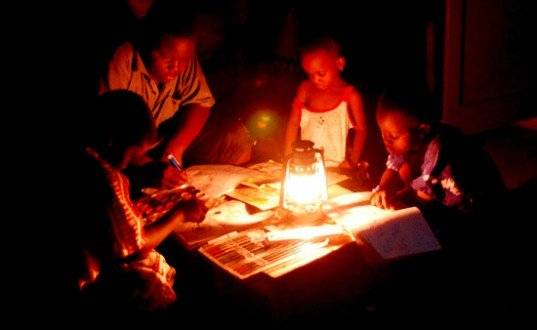Ghana faces an imminent power crisis unless the government urgently secures nearly $90 million to address fuel shortages for thermal power plants, a new report from the Ghana Grid Company (GRIDCo) has revealed. The crisis, if unaddressed, could lead to widespread power outages, popularly known as "dumsor," which would severely disrupt economic activities and public services nationwide.
The GRIDCo report highlights that the funds are necessary to procure alternative fuels such as light crude oil to compensate for disruptions in natural gas supply caused by a pipeline maintenance exercise. The situation has sparked widespread concern among stakeholders, who are calling for swift government action to avert a potential energy catastrophe.
The Origins of the Crisis
The current predicament stems from a generation capacity deficit following a pigging exercise by the West African Gas Pipeline Company (WAPCo). The exercise, which involves cleaning and maintaining the gas pipelines that supply natural gas from Nigeria to Ghana, temporarily halted the flow of gas to thermal power plants.
This disruption has created a significant shortfall in the fuel supply required to power thermal plants in Tema, which are critical to meeting Ghana's growing electricity demand. The WAPCo maintenance, initially scheduled for October 2024, was postponed to January 2025 by the previous government, exacerbating the timing of the crisis.
GRIDCo’s Call for Action
In its report, GRIDCo outlined a series of recommendations to mitigate the impact of the fuel shortage and stabilize the national grid. The company emphasized that securing funding for alternative fuels is the most urgent priority.
“There is a deficit in generation capacity during the period of the WAPCo pigging exercise. Therefore, it is necessary to procure liquid fuel to operate thermal plants in Tema to meet demand,†the report stated. GRIDCo estimates that $89.90 million is needed to purchase sufficient quantities of light crude oil or other liquid fuels to ensure uninterrupted power supply.
Proposed Mitigation Measures
To address the crisis, GRIDCo has proposed the following strategies:
- Rescheduling Planned Maintenance: Revising maintenance schedules for power generators to prevent overlaps with the WAPCo maintenance period.
- Securing Alternative Fuels: Procuring light crude oil or other liquid fuels as substitutes for natural gas in thermal power generation.
- Load Management: Considering controlled load-shedding as a last resort to stabilize the national grid in the event of severe power shortages.
These measures are designed to minimize disruptions and maintain grid stability until the gas supply is restored.
Economic and Social Implications
The potential consequences of failing to act are dire. Prolonged power outages could cripple industries, disrupt businesses, and negatively impact the livelihoods of millions of Ghanaians. Key sectors such as healthcare, education, and transportation would also face severe challenges, amplifying the urgency of the situation.
For Ghana’s economy, which is already grappling with fiscal constraints, a power crisis could further strain public finances and reduce investor confidence. The manufacturing and services sectors, heavily reliant on stable electricity, would be particularly affected, leading to potential job losses and decreased productivity.
Stakeholder Reactions
The GRIDCo report has sparked widespread concern, with stakeholders urging the government to act swiftly. Energy experts and industry players have called for expedited measures to secure funding and implement GRIDCo’s recommendations.
"This is not just a technical issue; it’s a matter of national importance. The government must prioritize securing the necessary funds to prevent a full-blown power crisis," an energy analyst said.
Civil society organizations have also weighed in, emphasizing the need for transparency and accountability in the management of funds allocated to address the crisis.
Government’s Role
As pressure mounts, the government is under scrutiny to demonstrate effective leadership in addressing the looming crisis. Securing the required $90 million will likely involve a combination of budget reallocations, negotiations with international partners, and public-private partnerships.
The government must also ensure timely communication with the public to manage expectations and avoid panic. Clear updates on the steps being taken to resolve the issue will be critical in maintaining public trust.
A Broader Conversation on Energy Security
The current crisis has reignited discussions about Ghana’s energy security and the need for a diversified energy mix. Over-reliance on natural gas for thermal power generation has exposed vulnerabilities in the system, highlighting the need for investment in renewable energy sources such as solar and wind power.
Industry experts have called for a long-term strategy to reduce dependence on imported fuels and enhance the resilience of Ghana’s energy infrastructure. Such measures would not only mitigate the risk of future crises but also support the country’s transition to sustainable energy solutions.
Conclusion
The GRIDCo report has issued a stark warning about the potential consequences of inaction. With $90 million needed to avert a power crisis, the government faces a race against time to secure funding and implement the necessary measures.
As Ghanaians brace for the possibility of disruptions, the situation underscores the importance of proactive planning and investment in the country’s energy sector. The coming weeks will be critical in determining whether Ghana can avoid another chapter of dumsor and safeguard its economic and social stability.




No comments yet
Be the first to share your thoughts!